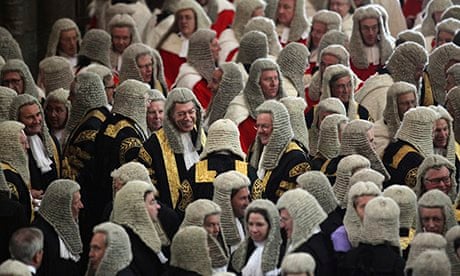Sir James Munby gave a speech last week saying that judges no longer concerned themselves with the promotion of virtue and the discouragement of immorality – and nor should they: Britain is now a secular society, he said, and religion has no special privilege beyond what it is granted by human rights legislation. This was widely reported as claiming that the law no longer has any business enforcing morality. I have now read his speech carefully and I am not at all certain that this is what he said – and if it's what he meant he is clearly wrong and his own speech proves it. Judges, he thinks, are very much in the business of enforcing morality, and so they ought to be. The confusion, and it's a very important one, arises from supposing that morality now means what it meant in respectable circles 100 years ago – a form of 19th-century Protestantism.
Much of his argument is wonderfully clear and, more importantly, right. Within living memory many influential judges did assume that morality was largely concerned with sexuality and the application of biblical standards of patriarchy in so far as this was possible. All this has gone. "Judges are no longer custos morum of the people, and if they are they have to take the people's customs as they find them, not as they or others might wish them to be," said Munby.
"And if they are" – that's where the argument shifts, because, as will become apparent, he does believe judges are the custodians of morality to some extent. I suspect that any other view is incoherent, or at least wicked. The burden of his talk is an attack on religious privilege. It seems odd to suppose that this must also be an attack on morality.
For Munby's claims about what has replaced morality are themselves profoundly moral ones. They have to be. Look at his praise of tolerance.
He wants to live in "a tolerant society, increasingly alive to the need to guard against the tyranny which majority opinion may impose on those who, for whatever reason, comprise a small, weak, unpopular or voiceless minority".
This seems to me an entirely and unavoidably moral desire. What justification is there for not imposing our views on a small, weak, unpopular or voiceless minority? You can't answer the question without using moral concepts. What amoral reason could there be not to impose our views on the minority? Only that we might fail in the attempt and that's not often a serious danger.
Similarly, his argument against privileging religion is not based on the idea that we can sidestep morality, but on the belief that our idea of morality is better and truer than Lord Denning's was in 1957. Munby said that "Reliance upon religious belief, however conscientious the belief and however ancient and respectable the religion, can never of itself immunise the believer from the reach of the secular law." I don't think many people would disagree with this – I certainly wouldn't. But the question then becomes how to draw the line, and the answer most certainly involves moral judgment and reasoning, as he goes on to recognise.
"Where precisely the limits are to be drawn is often a matter of controversy. There is no 'bright-line' test that the law can set. The infinite variety of the human condition precludes arbitrary definition."
Even when Munby has recourse to European human rights law, he remains enmeshed in the problem: he points out that the European Convention on Human Rights "forbids the state to determine the validity of religious beliefs" but that prohibition depends on a very narrow definition of validity and religious beliefs. What he means, clearly, is that the state has no business with the truth claims of religious mythologies: the state should have no opinion on whether Jesus rose from the dead, or if Muhammad really heard the angel Gabriel. But in other respects the convention positively demands that we determine the validity of religious beliefs. Are they, for instance, "worthy of respect in a democratic society"? Are they "compatible with human dignity"? These, again, are moral judgments, which society cannot avoid and should not try to.
Munby's easy acceptance that morality means what Lord Denning thought it did abandons a very necessary battlefield and hands victory there either to religious conservatives who claim that morality must have a supernatural sanction, or to the kind of market fundamentalists who claim that morality is unnecessary or unproblematic. Humanists need to do better than that.

